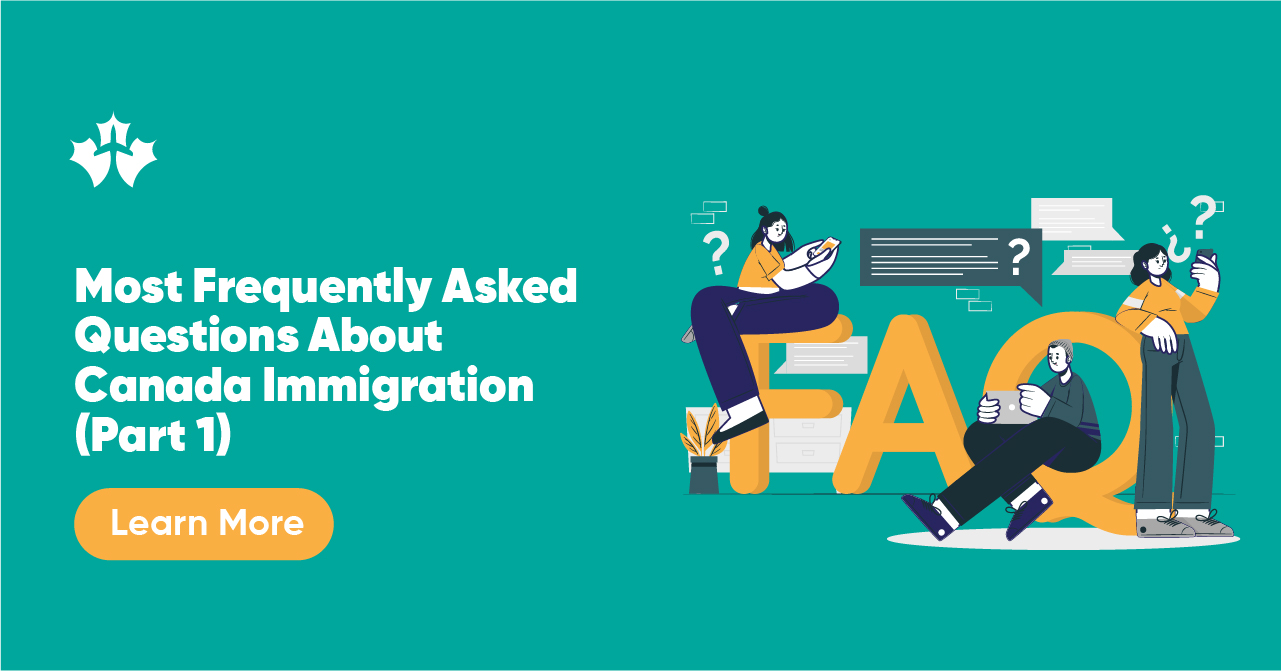Our Blogs
Most Frequently Asked Questions on Canada Immigration Part -1

Canada has consistently been a top destination for immigrants seeking a better life. With its high quality of life, strong economy, and diverse culture, it’s no wonder that many individuals and families dream of making Canada their new home. However, navigating the Canadian immigration process can be complex, and prospective immigrants often have several questions. In this blog, we’ll answer five frequently asked questions on Canada immigration to help you better understand the process. make it short and simple.
How do I get a PR card in Canada?
A permanent resident (PR) card serves as official confirmation of your permanent resident status in Canada. For newcomers to Canada, the issuance of the PR card is automatically handled as part of the immigration process, and there is no need for you to submit a separate application to obtain one. Canadian border officials will complete the necessary paperwork when you arrive in Canada, and your first PR card will be mailed to you within approximately three to four months. For the most current processing times, you can refer to the government website.
Helpful Tip: While not mandatory, it can be beneficial to have a Canadian address readily available when you arrive at the border, as this is where your PR card will be delivered. If you relocate within Canada before receiving your PR card, it is important to notify Immigration, Refugees and Citizenship Canada (IRCC) of your change of address.
However, if you need to renew your PR card, update your legal name or gender designation on the card, replace a lost, stolen, or damaged card, or if you have a unique immigration circumstance, the following steps outline the process for applying for a new PR card:
- Gather Required Documents: This includes your existing PR card (if renewing), a valid passport or travel document, photographs, and translations of documents if they are not in English or French.
- Complete the Application Form: Fill out the “Application for a Permanent Resident Card and Document Checklist” form.
- Pay the Fees: The fee for a PR card is $50 CAD, and there is an additional biometrics fee of $85 CAD per person or $170 CAD per family. Include the payment receipt with your application.
- Submit Your Application: You can either mail your application or send it via courier for processing.
What is a PR Visa ?
A PR visa, or Permanent Resident visa, is granted to foreign nationals who have been given permanent resident status in Canada but are not Canadian citizens. This visa is placed in their passport and allows them one-time entry into Canada. It comes with a validity period during which individuals are expected to travel to Canada and complete their landing formalities. It’s important to note that individuals in Canada temporarily as students, foreign workers, or visitors do not hold permanent resident status and, therefore, are not issued a PR visa.
Becoming a permanent resident in Canada is typically pursued through immigration streams such as Express Entry and Provincial Nominee Programs (PNP). Refugees can also attain permanent residency through programs like the Government-Assisted Refugee Program or the Private Sponsorship of Refugees Program.
How to migrate to Canada? Canada offers various immigration pathways for newcomers seeking permanent residency, including:
- Express Entry (EE): Known for its fast processing times, EE is a popular choice.
- Provincial Nominee Programs (PNP): Tailored for individuals with skills and experience to contribute to specific provinces or territories.
- Atlantic Immigration Pilot (AIP): Designed for skilled foreign workers and international graduates in Newfoundland and Labrador, Prince Edward Island, Nova Scotia, and New Brunswick.
- Start-up Visa (SUV): Entrepreneurs can apply to build innovative businesses in Canada.
- Rural and Northern Immigration Pilot (RNIP): A community-based program promoting economic immigration to smaller communities.
- Family Sponsorship: Allows family members to live, work, and study in Canada as permanent residents.
- Quebec-selected Skilled Workers: Designed for skilled workers interested in living and working in Quebec.
- Caregivers: Options include the Home Child Care Provider Pilot, Home Support Worker Pilot, and Live-in Caregiver Program (LCP).
- Self-employed: The Self-employed Persons Program welcomes individuals with experience in cultural activities or athletics.
- Agri-food Pilot: Addresses labor needs in the Canadian agri-food sector and offers a pathway to permanent residency.
How to move to Canada as a family? Your family can potentially immigrate to Canada as your dependents.
- Your spouse or common-law partner
- Dependent children
- Dependent children of your spouse or common-law partner
- Children of dependent children
However, it’s important to note that your dependents cannot enter Canada before you do.
Alternatively, you have the option to sponsor eligible family members through the Family Sponsorship Program, enabling them to reside, work, and study in Canada. As a sponsor, you must demonstrate that you can:
- Provide for your family member’s essential needs, such as food, shelter, and clothing.
- Financially support your family member for a specified period.
- Not be receiving social assistance, unless due to a disability.
To have your profile evaluated and receive professional advice on any of your questions regarding Canadian immigration, get in touch with us experienced immigration consultants from SPSCanada. For additional information, contact support@spscanada.com (Canada), support.amd@spscanada.com (Ahmedabad), or by phone at (1) 905-362-9393 (Canada) or +91 9586 226232 (Ahmedabad).
Comments
Our Clients
We're Trusted Globally
We are a regulated immigration practicing firm, providing advice and
solutions on matters related to Canadian immigration.














